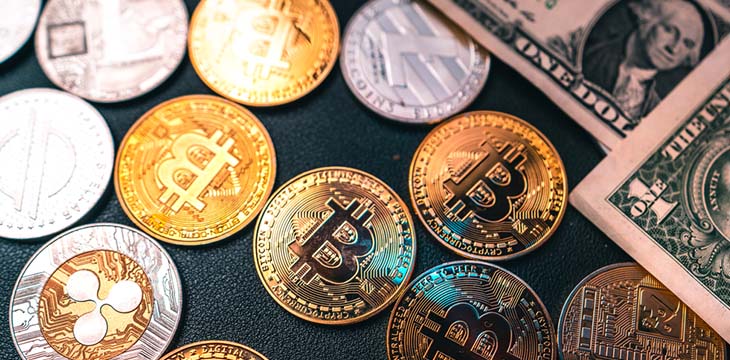|
Getting your Trinity Audio player ready...
|
The International Monetary Fund (IMF) and the Financial Stability Board (FSB), at the request of the Indian G20 presidency, have released a joint policy paper with recommendations related to “macroeconomic and financial stability risks associated with crypto-assets.”
The joint paper outlines some of the critical risks associated with digital asset activities, as well as describing how the policy and regulatory frameworks developed by the IMF and FSB fit together and interact with each other. The paper does not, however, offer any specific new policies, recommendations, or expectations for G20 members.
“At the request of the Indian G20 Presidency, the IMF and the FSB have developed this paper to synthesise the IMF’s and the FSB’s (alongside SSBs’) policy recommendations and standards,” said the FSB in a press release. “The collective recommendations provide comprehensive guidance.”
The paper focused on the risks associated with stablecoins and decentralized finance (DeFi).
In relation to stablecoins, it noted concerns that the supposed stability of stablecoins could deepen interconnectivity between digital asset markets, traditional financial institutions, and retail market participants—thus increasing systemic risk. Stablecoins, the paper suggested, are also vulnerable to the ‘mechanisms’ stablecoin issuers claim they use to maintain stable values.
“Fragilities in the governance, design, and reserve management of the stablecoin arrangement’s infrastructure, among other factors, could lead the stablecoin to de-peg,” said the paper.
This could, in turn, if revealed, lead to a loss of confidence and the equivalent of a bank run, as was seen in the case of TerraUSD and Luna in May 2022. When the TerraUSD (UST) stablecoin lost its peg to the U.S. dollar, the Terra Network’s native token, Luna, also crashed, causing mass liquidations of assets and an estimated loss of $300 billion in value across the entire digital asset space.
So, bearing in mind that stablecoins might not actually be ‘stable,’ if something goes wrong, it’s important to limit the damage. This is related to another point the IMF and FSB noted: “Global Stablecoins” may transmit volatility more abruptly than other digital assets, causing a greater risk to global financial stability.
Regarding misleadingly named concepts, the paper also had some thoughts about DeFi: “Claims of decentralisation often do not hold up to scrutiny.”
This is a take becoming increasingly mainstream amongst observers of so-called decentralized networks and protocols—the myth of decentralization. An example is a report prepared by tech security assessors/advisors Trail of Bits (ToB), in June 2022 for the Defense Advanced Research Projects Agency (DARPA), the research and development arm of the U.S. military. In relation to BTC, it noted how there are currently only four “active contributors with access to the Bitcoin Core codebase, the compromise of any of whom would allow for arbitrary modification of the codebase.”
Leading to the natural conclusion that the apparently decentralized BTC is, in reality, controlled by a core group of identifiable developers, or ‘maintainers,’ with the power to make changes to the network—i.e., centralized.
In fact, this very assertion is the subject of an ongoing court case in the United Kingdom.
The IMF/FSB paper also suggested that rather than representing an entirely new form of financial entity, DeFi, in fact, poses a very similar risk to traditional finance.
“While the processes used to provide services may differ from those of the traditional financial system, DeFi does not differ substantially from the traditional financial system in the functions it performs,” stated the paper.
As such, in attempting to replicate some of the functions of traditional financial systems, DeFi may inherit and even amplify the vulnerabilities of those systems. This includes operational fragilities, liquidity and maturity mismatches, leverage, and interconnectedness.
The paper rounded off its warnings about DeFi by suggesting that such entities “may exhibit unclear, opaque, untested or easy-to-manipulate governance frameworks that may expose users to risks.”
While it didn’t offer any new policy recommendations, the paper brought the IMF and FSB digital asset recommendations together into unified “policy responses” to the key risk areas under discussion.
In terms of macroeconomic stability, the paper suggested safeguarding monetary sovereignty and stability; guarding against excessive capital flow volatility; addressing fiscal risk and adopting clear tax treatments; and monitoring the impact of digital assets on international monetary systems.
When it came to financial stability implications and regulatory issues, the paper recommended adopting the FSB’s high-level recommendations for digital asset; and targeted measures based on country-specific circumstances that “go beyond the global regulatory baseline to address specific risks,” such as might be appropriate for developing economies.
Other recommendations included enforcing Financial Action Task Force (FATF) standards, addressing problems related to under-collecting digital assets-related tax, and “in some jurisdictions, it may be important to clarify the application of existing laws or assess the need for new ones.”
This latter point was possibly a jab at the current regulatory stalemate in the U.S., as digital asset legislation has only recently begun to painstakingly make its way through Congress, leaving regulatory gaps in the meantime.
The goals of the joint paper, said the FSB, on behalf of itself and the IMF, was to encourage nations to “build institutional capacity beyond G20 jurisdictions; enhance global coordination, cooperation, and information sharing; and address data gaps necessary to understand the rapidly changing crypto-asset ecosystem.”
Watch: SEC Commissioner Hester Peirce on Blockchain Policy Matters

 02-28-2026
02-28-2026 




